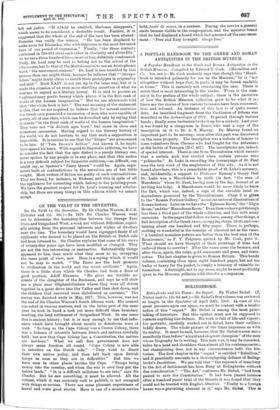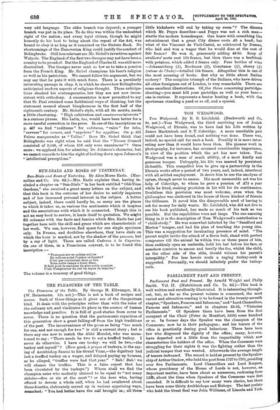BOLINGBROKE.
Bolingbroke and his Times : the Sequel. By Walter Siehel. (J. Nisbet and Co. 12s. 6d. net.)—Mr. Sichel's first volume was reviewed at length in the Spectator of April 20th, 1901. In view of the great pressure upon our space, we must be content with a briefer notice of this " sequel." Mr. Sichel is among the most pains- taking of historians. But this epithet must not be supposed to connote anything like dulness. His work is full of life and vigour ; his portraits, carefully worked out in detail, have their outlines boldly drawn. The whole picture of the times impresses us with its reality. It must be said, however, that Mr. Siehel is even more manifestly than before " a loyal and eloquent champion " of the man whose biography he is writing. This man was, it may be conceded, taller by a head and shoulders than almost all his contemporaries; but championing does not in any circumstances befit the his- torian. The first chapter in the "sequel" is entitled "Rebellion," and it practically amounts to a thoroughgoing defence of Boling- broke's Jacobitism. We are told that " the reproach of treachery to the Act of Settlement has been flung at Bolingbroke without due consideration." "The Act," continues Mr. Siehel, " had been passed to save the Constitution." It had been passed because after a hundred years' trial of the Stuarts it was found that they could not be trusted with English liberties. " Fealty to a foreign house was a prevailing element in it," says Mr. Sichel- This is very odd language. The elder branch was deposed; a younger branch was put in its place. To do this was within the undoubted right of the nation; and every loyal citizen, though he might honestly do his best to bring about the repeal of the Act, was bound to obey it as long as it remained on the Statute Book. No shortcomings of the Hanoverian King could justify the conduct of Bolingbroke. Still less relevant are Mr. Sichers invectives against Walpole. The England of the first two Georges may not have been a country to be proud of. But the England of Charles II. was still more discredited. The Georges never sank so low as to take a pension from the French King. Mr. Sichel champions his hero's religion as well as his patriotism. We cannot follow his argument, but we may say that he puts it with much force. There is a peculiarly interesting passage in chap. 9, in which he shows how Bolingbroke anticipated modern aspects of religious thought. These anticipa- tions shocked his contemporaries, but they are not now incon- sistent with orthodoxy. A commentator is now permitted to say that St. Paul retained some Rabbinical ways of thinking, but the statement seemed almost blasphemous in the first half of the eighteenth century. Mr. Sichel's style, with all its merits, needs a little chastening. " High cultivation and omnivorous interests " is a curious phrase. His Latin, too, would have been better for a more careful correction in the press. In one of the inscriptions on p. 497 we find "redituma" for rediturus, " vales " for tales, " cervere" for cernere, and " appeleus " for appellens. On p. 435 Valens masquerades as " Valius." Does Mr. Sichel think that Bolingbroke was right when he said that the " Nicean Council consisted of 2,048, of whom 318 only were unanimous"? Once more : we applaud him for admiring Dr. Johnson's character, but we cannot concede to him the right of looking down upon Johnson's "intellectual perceptions."



























































 Previous page
Previous page